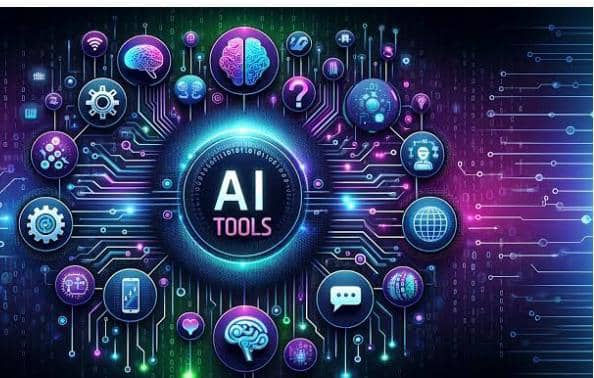
Our customer support team is here to answer your questions. Ask us anything!
Chat with us on WhatsApp

Written By: Flipbz.org
Artificial intelligence (AI) has become a transformative force in the modern business landscape, helping companies streamline operations, enhance customer experiences, and accelerate growth. By integrating AI tools strategically, businesses of all sizes can unlock opportunities for efficiency, innovation, and market leadership. This comprehensive guide explores how to use AI tools to drive your business forward quickly and effectively.
AI excels at automating repetitive tasks, allowing businesses to save time, reduce errors, and improve productivity. Routine activities like responding to customer inquiries, scheduling appointments, and managing invoices can be efficiently handled by AI-powered tools like chatbots, workflow automation platforms, and virtual assistants.
For example, AI chatbots provide 24/7 customer service, ensuring queries are resolved promptly without human intervention. Workflow tools like Zapier or HubSpot can streamline operations by automating follow-ups, data entry, and other mundane processes. This enables employees to focus on high-value activities, such as strategy and innovation, boosting overall efficiency.
Delivering personalized customer experiences is a game-changer, and AI makes this possible at scale. AI-driven customer relationship management (CRM) systems analyze user behavior and preferences to offer tailored solutions.
For instance, AI can track purchase history, browsing habits, and engagement patterns to recommend products or services that customers are more likely to buy. AI-powered chatbots handle common issues instantly, providing seamless support while reducing wait times. These tools also enable businesses to gather valuable feedback, helping them refine their offerings and foster stronger customer relationships.
Businesses generate massive amounts of data daily, but analyzing it manually can be overwhelming. AI tools specialize in processing large datasets to uncover actionable insights quickly and efficiently.
Predictive analytics, for example, allows businesses to forecast demand trends, optimize inventory, and adjust pricing strategies. Tools like Google Analytics and Tableau, powered by AI, help identify customer preferences, monitor campaign performance, and track key performance indicators.
By leveraging these insights, businesses can adapt their strategies based on real-time data, ensuring they remain competitive and proactive in their decision-making.
AI is transforming marketing by making it more targeted, personalized, and efficient. Marketing tools powered by AI, such as Google Ads, Facebook Audience Insights, or HubSpot Marketing Hub, analyze audience behavior to refine ad campaigns and improve performance.
For example, AI tools can determine which content resonates most with your audience, automate ad placements, and adjust targeting parameters for maximum ROI. AI-powered email marketing platforms segment audiences based on their preferences, sending personalized messages that drive higher engagement and conversions.
Additionally, AI assists in content optimization by analyzing SEO trends and generating suggestions for blog posts, social media updates, and videos tailored to your target audience.
AI tools are essential for improving workplace productivity and team collaboration. Virtual assistants like Siri, Google Assistant, and Alexa can manage schedules, set reminders, and perform research tasks, freeing up employees to focus on creative and strategic projects.
AI-enhanced project management software, such as Trello, Asana, or Monday.com, helps teams stay organized by automating workflows, providing real-time updates, and prioritizing tasks. These platforms also identify bottlenecks, enabling managers to allocate resources effectively and ensure deadlines are met.
For remote teams, AI tools like Slack and Microsoft Teams facilitate seamless communication through features like automated transcription, instant file sharing, and smart scheduling.
Financial management is another area where AI tools excel. Tools like QuickBooks, Xero, and FreshBooks automate bookkeeping tasks, such as invoicing, expense tracking, and financial reporting.
AI-driven systems also analyze spending patterns, identify areas for cost reduction, and provide real-time insights into cash flow. Businesses can use these tools to create accurate budgets, forecast revenue, and ensure compliance with tax regulations.
For example, AI algorithms can identify discrepancies in financial records, reducing the risk of fraud or human error. These insights allow businesses to allocate resources wisely and plan for sustainable growth.
AI doesn’t just improve existing operations—it fosters innovation. In product development, AI-powered tools can analyze market trends, customer feedback, and competitor data to identify gaps and opportunities.
Generative design platforms, for instance, enable businesses to create product prototypes quickly by simulating multiple design iterations. Machine learning algorithms also analyze usage patterns to suggest product enhancements that align with customer needs.
AI technologies such as augmented reality (AR), virtual reality (VR), and the Internet of Things (IoT) can be integrated into products to enhance customer experiences, opening new revenue streams and driving long-term business growth.
Customer support is a cornerstone of business growth, and AI has revolutionized this domain. AI tools like Zendesk, Intercom, and LivePerson enable businesses to offer instant support through chatbots and automated ticketing systems.
These systems can handle high volumes of inquiries simultaneously, reducing response times and ensuring consistent service quality. AI tools also use natural language processing (NLP) to understand customer emotions, allowing businesses to address concerns with empathy and precision.
Moreover, AI-driven analytics provide insights into common customer issues, helping businesses refine their processes and improve satisfaction rates.
AI tools have become indispensable for businesses aiming to grow fast in a competitive market. By automating tasks, enhancing customer experiences, leveraging data insights, and streamlining marketing efforts, AI offers a wide range of opportunities to achieve efficiency and scalability.
To make the most of AI, businesses should start by identifying areas where AI tools can deliver the most value. Investing in the right AI solutions and integrating them into daily operations will not only optimize processes but also foster innovation and improve customer satisfaction.
Embracing AI is no longer optional—it’s a critical step toward building a smarter, more efficient business that’s ready to thrive in the future.
The faster you adopt these tools, the sooner you’ll see tangible results in your growth journey.
Please register to comment.
With these components in place, your business...
Open the Listing model file located in the ap...
Discover promising partnership opportunities in various industries.
Pitch Your Startup | Find Partners
Comments